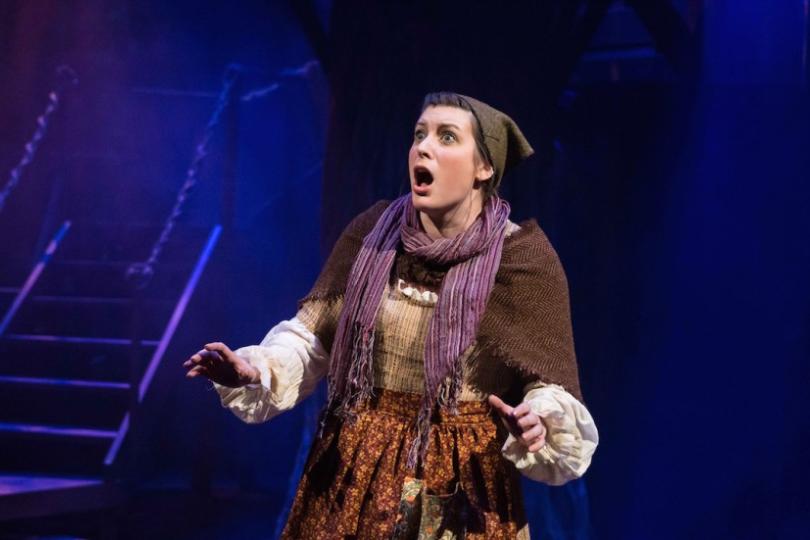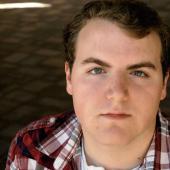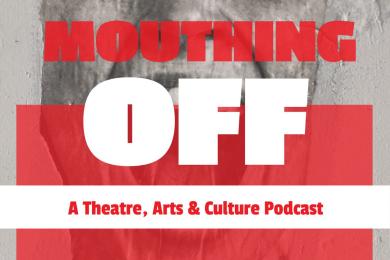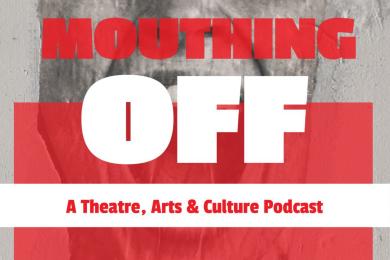Emerging Artist Profile: Kelly Matthews

As a child of the 90s, I am always the first to be asked to fix a computer at work. Normally I am annoyed by the stereotype of digital-savviness; the added pressure to know how to update Adobe or format a Word document because my birth was post-Reagan seems unfair. So when MinnesotaPlaylist approached me about writing an article that leverages my age, I was shocked. “Do an interview with a fellow emerging artist?” “Wait,” I thought, "am I emerging?” Then I thought, “What does “emerging” mean?” Still, as Sondheim said, “Opportunity is not a lengthy visitor!” so I agreed to visit a young actor in town who I have always admired: Kelly Matthews (née Houlehan). Her previous credits include Equity houses like the History Theatre in downtown St. Paul and unpaid gigs on the outskirts of our fair Twin Cities. She is always out there performing, auditioning, and being an active member in the community. And, to me, those are the qualities of an emerging artist.
On one rainy Sunday I drove to her house in south Minneapolis, which she shares with fellow actor and husband Philip Matthews. I set up my iPad to record, she got us some water, and we talked about her, her work, and what it means to be a young artist here in Minnesota.
Because there is not a LifeTime movie about you yet, can you tell us about yourself?
KM: Well, I’m Kelly Matthews and I am 26 now and I work in the Twin Cities theater scene. My degree is from Nebraska Wesleyan University and I have a B.F.A in Theater Performance with an emphasis in musical theater performance - whatever that means, right? I just got married a little under a year ago and I live here in Minneapolis with my husband, who is an actor too. I work a day job at a non-profit Christian ministry setting where we do a lot of events and event planning. I have a BFA and I have BA in Communications. When I first went to school I really wanted to study marketing, so I specifically looked for schools that were non-conservatory. I wanted to leave college with not just a B.F.A but with a liberal arts education.
LS: Do you feel having another degree influences your performance work?
KM: When you study communications, you study a lot of communication theory and looking at why people communicate with each other the way they do, so it applies to characters. And I think it applies a lot to directors on understanding their communication styles.
So what made you study theater in college rather than just start to audition right away?
KM: A lot of people are like Nebraska? Whaa? but I knew I wanted to explore musicals, so I wanted somewhere with lots of opportunities. I got to do 45 faculty-directed shows and a bunch of student-directed ones. So having so many literal performances really shaped me ethically. I really learned what it means to be a good actor in a rehearsal, [and] the whole [other] sides of being an actor, auditioning, showing up on time, being prepared. Really, how to set yourself to be really successful with your director and other actors. So I feel I would not have had that had I not gone to school.
What were a couple things you have learned in the casting/waiting room that college did not prepare you for?
I think being at school is like working at a company—working with the same faculty members and students. It took me a while to adjust to working with new companies each time, especially in the beginning. Nobody knows my strengths or my weaknesses; I do not know necessarily how to best work with that director or my cast mates, so trying to learn those aspects of each other is difficult. The longer I’ve worked here the more I understand why directors or companies retain people. Because that learning curve on getting to know each other, on how to be vulnerable together [is tough]. I got spoiled in school by having that company mentality. I have worked a lot of different places since I got here, so there was a lot of brand new people and brand new relationships—that was good for me.
Many, if not all, theater artists get constant questions from our friends, family, neighbors -
KM: - when are you going to New York?
LS: Yeah! “When are you going to Broadway” or “moving to Hollywood”? How do you justify choosing the Twin Cities community as your artistic home over the more well-known acting cities like New York, Chicago or even Los Angeles?
When I graduated from school I was in a relationship with Philip, and he was a year behind me. So my plan was go to back to Minneapolis to work for that year and see what I can do - build up my resume so it is not just collegiate; when Phil graduates, we would move to New York. Our program was very New York-centric. The pressure to move to New York was definitely present.
So in that year he was still in school and I was here, I just had a lot of really great opportunities and for someone who had no reputation, I just felt there were a lot of really exciting things happening. And I felt like I was watching my classmates who moved [to New York] not get work. Like this girl I really respected, who was older, moved to New York and was not successful. People are struggling to make their rent and not even auditioning, or they're just submitting and not really getting any auditions. When Phil graduated I was like “Hey! I know our plan is New York and I’m not trying to abandon that, but I feel there is a lot going on here and I think we should come up and give it a year together.”
. . . I have also met a lot of actors here that have lifestyles we would like. We’re always figuring out how we can be two actors in a relationship that some day want to have a family. How the hell will all the pieces fit together!? My first winter I worked here, I essential’d Christmas Carol and met Nat Fuller. He and his wife are both actors, and he talked to me about what that was like for them. Angie Timberman was in that show too, and the next year her husband Jay was in that show with me when I did it again. So here are real people that are crazy talented who have kids and are making it work. . .
So if you got a gig somewhere else - like if you met some fancy director in Chicago and he wants you at Steppenwolf. Would you feel comfortable doing that knowing that Phil is here?
Yeah, absolutely. Our long-term goal is not to live different lives. Like I know he wouldn’t want a Twin Cities career while I have a Chicago career, but certainly for an opportunity or a show. We have talked about how we’re still young enough to go to some regional auditions and see what is out there for us. And on the other side of that, I feel it is fun to be someone in the community. He understands. It is fun to support him and his craft and meet the people he is doing things with. There have been opportunities for me because of the people I have met through him and of course the other way.
You mentioned earlier that you work for a Christian non-profit; you have financial stability elsewhere. As we all know, running from stage work to day work is taxing on one’s spirit. How do you continue to fuel that that artistic fire balancing a day job with your acting? How do you burn the candle at both ends and still continue to audition?
I think my program in college really prepared me for that lifestyle. We did seven day a week rehearsals for shows. We did short rehearsal periods, so I was very used to balancing my college load; I was pursuing another degree too. And then we would go to rehearsal that night and often times we were doing two shows at once! I was very used to that idea of “if you want to be successful in theater, it won’t come knocking on your door - you have to work for it!” I am lucky with my day job ‘cause they’re very flexible with me. If I have a tech week or have complicated hair and makeup I have to figure out, they’re very understanding about it. And it helps them ‘cause when I know they support the other side of my life, it makes me want to put more into that [day job] too.
I haven’t done that many big, fancy paid weekly jobs yet but I have seen that mentality of some people [in those weekly paid jobs] that just see it as “I am just doing my job,” while those people who have that [non-theater] day job want to be there. They’re looking for that opportunity -- they want to be part of that show. I just did Into the Woods at Lyric Arts and obviously they do not pay, they are one of the last places I work that do not pay at all just cause I love the work they do.
Nobody who was there was an Anoka townie that just happened to be in the play; it was all young people who recognized that doing Into The Woods at a place with a built-in audience, a good director, and support was a great opportunity. So everyone was driving at times like 40 minutes for no pay to be there. While that was not the ideal situation for the actors, there was some kind of camaraderie.
It was one of the cleanest rehearsal processes I have been part of in a long time. They were all like “I am here--my time is here and I want to work and want to get the most out of what I am doing.” So seeing other people working as hard as I am energizes me. And then hopefully you move from the free to the stipend to the bigger stipend then the weekly pay. So it feels for me that I am seeing my career growing and that motivates me.
So then do you feel that as emerging artists, it is important to take those jobs for the opportunity and the experience, regardless of pay?
My personal philosophy on it is that as a woman, we are too easily replaceable - it is too easy to find somebody else. I want to try to take a mix of what I feel is professionally advancing (like better pay, or a “better company”, or more exposure) and pairing that with shows that I felt are artistically rewarding or parts that show me off.
Sometimes when I take the better paid show, the role isn’t showing me off in the best way, so being able to pair that with a role I can delve into or do more with has helped me feel that there is an artistic balance in my life. And it helps me show that I have something when I enter an audition room—I can be like “I am the one you want - I have the credentials, I have the experience.” So although I have been that dancing tree for a hundred dollars a week, I have also been the Baker’s Wife for free. But I feel that if I only take jobs that pay me really well, I would not be working as much as I have. That is really important for me. For me, it is better to work than not, so I take the best possible opportunity I can and run with it. And sometimes it is like “Oh maybe this isn’t the best use of my time” or it was the best of all the worlds, but I have continued to grow my resume and connections, and of course get better as an artist.
So with all of that said about payment and achieving artistic balance, how do you define professional and amateur in the Twin Cities?
Oh man, I guess the first thing that comes into my head is whether a person has some kind of training, and after that how committed the person is to this career. . . I feel that this town is a bit misleading in that there are a lot of semi-professional theaters that are very varied in what they are offering their audiences in terms of quality. It is easy to look at it like “Oh, this is all community theater,” that anything that is not paying a weekly wage is community theater and those people are not professional. I think there are a lot of semi-professional actors in town that are trying to get into places doing better work on the semi-professional scale, and then try to push into those [full-time] theaters. But if you just count those theaters offering Equity contracts or weekly wages, then you are discounting a lot of people who are working really hard and doing a lot of really good work - there just aren’t enough seats at the table.
What do you want to see as a resident of this artistic community?
I have had some really phenomenal experiences working on new musical theater work. . . It feels like a different level of existence inside the form; to be pushing and pulling. So I would love to see more new work, and more musical work that is really given time and space to be collaborated on—not just rushing to the product. And, with that, I feel that everything dies so fast. It is like you’re working really hard to put something on, and it is only for three weekends.
So that is something that is really hard in this community: that there are so many semi-professional actors—you may get a break, feeling like you got one of those seats at the table, but the contract is maybe for only two months.
So you’re saying the fall from grace is very hard and fast? You may be working at a well-known Equity house, and then you’ll be doing a small stipend show right after that?
Yeah, if you look at the last sixth months of my life, I was doing Into the Woods for free at Lyric and then was on a weekly wage at History Theatre and then a large stipend at Public Theater of Minnesota. It was all over the board and that was just from this winter to this summer - not even a whole year of my life. So I wish that theaters here would offer more “company” structures. I feel that the level [of quality] would go up knowing each other and then there is less stress due to stability in your life. Even with some of those people who are doing the very, very best in town, you’ll see a cry on Facebook, “I am two weeks shy on my insurance and I really need it. Does anyone know of an Equity gig? Is anyone willing to do a concert or something so I can get my weeks?” And these are the people who are supposed to be the most secure and the most taken care of, and even those people are struggling.
Where do you see yourself in five years?
The most important thing in terms of my theatrical career is that I just want to keep working—that is how I have always felt. Of course, you hope you can work in “better” places and make more money. It would be great if both Philip and I were full-time actors by that point and that was our life, but if that is not in cards then I just want to keep working. It is like when you asked me why I don’t go to New York; it is because I have no good examples of people I know who have been able to do the work there I have done here. My friends who live in other places are flabbergasted that I am working so much. And maybe have kids by then? Did you know that having a baby at 35 and over is considered a geriatric pregnancy? Sorry but true story! I would just love to have a kid or two and still be working. There was that huge article in American Theater Magazine about women having kids and how there is no maternity leave in theater, and how much stress that puts on you when trying to create a career.
What is one experience as either an actor or an audience member that was a unique theater experience?
Well, how about a theater horror story? I was doing BareFoot in the Park at Lyric Arts. At the top of Act Three, there is this silent scene and this big fight and a lot of stage business. So I went to slam this door and because I am dumb I grabbed the doorframe instead of the handle; it was so I could get a better slam. My hands were wet from these towels and they slipped downwards and crushed my fingers in the door. And was like “Oh, this is really bad.” It was final preview so we weren’t opening so I could have stopped but there were a lot in the audience. And I have never stopped a show with an audience in my life! . . . The blood is like gushing out of my hand and was running down my hand. So I grabbed this napkin and clenched it during the whole scene. Brendan, the man playing my husband, was like ‘Why were you being so weird with your blocking? And only acting one handed?!’
For more information on Kelly Matthews, visit her website at www.kelly-matthews.com. She will be performing in Freshwater Theater Company’s Pioneer Suite this month.




